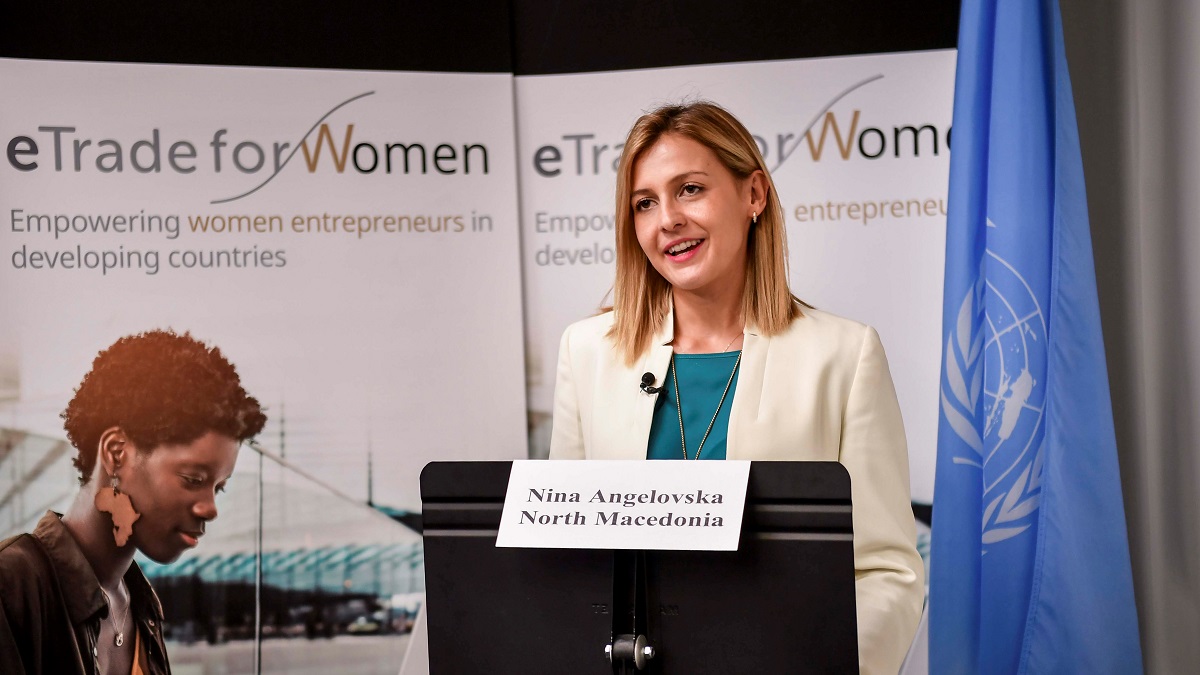A new UNCTAD report outlines ways to accelerate a more gender-equal digital economy for women’s economic and social empowerment.
UNCTAD Photo | Nina Angelovska spoke on the margins of the 74th session of the UN General Assembly in New York to advocate for women in the digital economy.
The digital economy is booming. E-commerce sales worldwide, for example, grew 4% to an estimated $26.7 trillion in 2019, according to the latest data.
But not everyone is benefitting equally. Women across regions and continents still face many obstacles to start and grow digital businesses, including gender bias, lower participation in decision-making processes, and unequal access to funding and technology.
With the necessary support and resources women could add nearly $300 billion to e-commerce markets in South-East Asia and Africa between 2025 and 2030, according to International Finance Corporation estimates.
How to unlock women’s potential in the digital economy is the focus of an UNCTAD report published on 8 December.
It draws on the growth path of seven businesswomen from developing countries, who in 2019 became the first cohort of advocates for UNCTAD’s eTrade for Women initiative.
The report looks at the factors that have propelled the seven advocates to succeed, as well as the challenges they faced, before laying out recommendations to empower women in the digital economy.
“The actions we take today will help shape a more gender-inclusive digital economy, where everyone can benefit equally from the biggest economic transformation of our times,” says Shamika N. Sirimanne, UNCTAD’s technology and logistics director.
Shoring up support
In the report, lead author Nina Angelovska, along with her fellow advocates, calls for policies to tackle the socio-economic constraints hindering female digital entrepreneurship.
They urge more equitable digital infrastructure, emphasizing that “connectivity, accessibility and affordability of the internet are prerequisites.”
Another focus is on improving women entrepreneurs’ access to finance. In this area, governments can offer complementary schemes – grants, guaranteed loans and so on – in addition to private investors’ efforts.
Additionally, the report recommends involving more women entrepreneurs in relevant dialogues and consultations when it comes to digital policymaking.
“To tackle inequalities in the digital economy, we need to ensure women have a seat and a voice at the policymaking table,” Ms. Sirimanne says.
Sharing first-hand experiences
Ms. Angelovska recounts her story as an e-commerce trailblazer in her native North Macedonia.
As a 21-year-old, Ms. Angelovska won a national competition with her business plan and subsequently launched Grouper.mk, the very first group deal buying platform in her country.
Back in 2011, only 2% of consumers in North Macedonia bought online. But the digital economy there has since come a long way, especially after Ms. Angelovska in 2017 established the country’s first e-commerce association, where she remains as president.
According to the World Bank, more than 30% of Macedonians shopped online in 2021.
“In order to push for change and have our voice heard, we realized that we needed to represent and speak on behalf of the industry,” Ms. Angelovska says. “This is how the eCommerce Association of North Macedonia was born.”
Advocating for women digital entrepreneurs
The report also received contributions from Ms. Angelovska’s fellow advocates: Clarisse Iribagiza of Rwanda, Helianti Hilman of Indonesia, Claudia de Heredia of Mexico, Xiaofei Yao of China, Nazanin Daneshvar of Iran and Patricia Zoundi Yao of Côte d'Ivoire.
In June 2022, UNCTAD appointed five new women advocates to continue promoting more inclusive e-commerce ecosystems while inspiring their peers in the digital economy.
This is important because, according to the report, women (54.7%) show less confidence than men (66.2%) in their capability to start a business – even though one in three active growth-oriented entrepreneurs worldwide is a woman.
The eTrade for Women initiative is funded by Germany, Sweden, Switzerland and the Netherlands.

